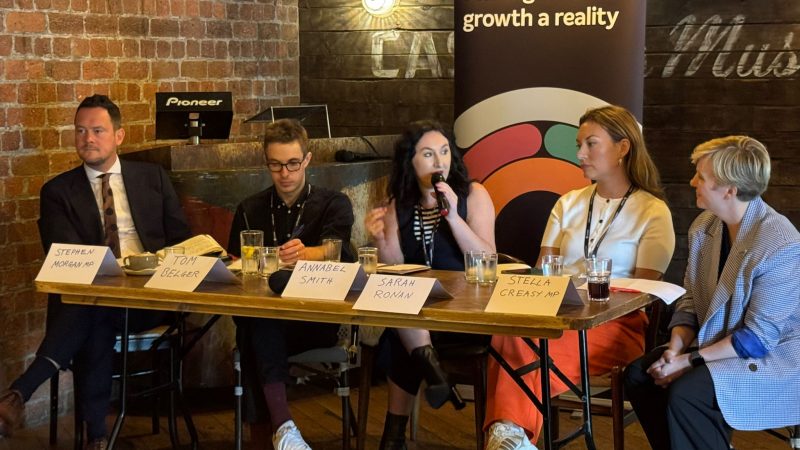
Childcare is as an essential part of economic infrastructure as roads and public transport and extensive work is required to transform current provision into a universal system, a panel at Labour conference has said.
At a LabourList event on childcare, in partnership with the Centre for Progressive Policy, Labour MP and Mummafesto podcast host Stella Creasy that a functioning childcare system is “absolutely vital” for delivering growth, “in the same way we have a functioning road system and public transport systerm”.
She said that the government first has to “steady the ship” after the mess left behind by the Conservative government in this area.
“There has been a 50 percent increase in the number of closures of childcare settings in the last year, even when that money has gone in – 30 percent of nurseries are using temporary staff to fill the gap,” she explained.
Creasy also said childcare needs to fit into a broader conversation about the kind of workplace and family life we want everybody to have.
“Childcare doen’t sit in a vacuum. It sits in that concept of what makes it worthwhile to be able to work, to be able to have a family, to be able to see your partner and to not be permanently in need of more than four hours of sleep.
“Other countries understand this and they are moving towards what ultimately we need to get to, which is a universal system in stages.
“We are so far away from that in this country and, as a consequence, we are suffering economically.”
‘Devalued and demoralised’
Annabel Smith said that the workers in the childcare sector are “devalued and demoralised”, but said that, with a recruitment and retention crisis, policy areas could help address some of those issues, in particular by introducing pay scales similar to that in the teaching sector.
She welcomed the recognition and political salience of childcare in recent years, particularly following the expansion of free childcare for working parents.
However, she also addressed the “elephant in the room” and said: “The workforce is already under significant pressure. We’ve done work recently on what the full rollout would entail in terms of the workforce – it would drive it up by 52 percent, which would be about 28,000 new full-term workers.
“Clearly, there is a lot of work to do – if you are driving up demand so highly, you also need to drive up supply.”
Tory childcare plans were ‘politics, not policy’
Sarah Ronan, director of the Early Education and Childcare Coalition, also said that the announcement by the previous Conservative government to expand free childcare provision was a “watershed moment in terms of recognising the role of childcare as vital infrastructure” but criticised the lack of consultation around the announcement and said the measure was about “politics, not about policy”.
She said: “It wasn’t about delivering what families really need and what children really need. It was about taking the wind out of Labour’s sails on the issue of childcare.”
Ronan said the way the Conservatives’ policy was introduced provoked a range of problems, particularly for local authorities, and crucially “it also created this sense that subsidised childcare is a reward for going to work, not an enabler of it”.
She said that reform to ensure the scheme benefits the most disadvantaged people would ensure that free childcare provision fulfils its potential.
‘Early years a priority for new government’
Stephen Morgan, minister for early education, said that early years would be a priority for the new administration and was also critical of the Conservative inheritance left for the Labour government, describing the policy as being equivalent to announcing a mission to the Moon without a plan to build the rocket.
He said: “The Tories left a trail of devastation across education, a black hole in our national finances and a pledge without a plan on childcare and early education.
“As a new minister, I’ve been genuinely shocked by how irresponsible the last government was on this.”
Morgan was questioned about the Bell Review into early years, which is understood to have urged Labour to develop and publish a strategy on early childhood education and care in its first year of government.
He said that the findings of the report would “inform what we do next” and said: “If we are going to deliver on giving children the best start in life, we’ve got to work with everyone to make that happen.”
Follow all of the news and debate at party conference 2024 by LabourList here, the leading dedicated platform for Labour supporters on all things Labour:
READ MORE: LabourList events not to miss on Sunday – from our rally to debates on childcare, privatisation and the Greens
READ MORE: Sunday at conference: Five of the best speeches, panel events and receptions to prioritise
READ MORE: Anger as women’s conference assigned only 20 minutes to debate each motion
READ MORE: Anneliese Dodds writes on why the election was a win for women
READ MORE: The full LabourList events programme, from karaoke to key panel debates
SHARE: If you have anything to share that we should be looking into or publishing about this story – or any other topic involving Labour– contact us (strictly anonymously if you wish) at [email protected].
SUBSCRIBE: Sign up to LabourList’s morning email here for the best briefing on everything Labour, every weekday morning.
DONATE: If you value our work, please donate to become one of our supporters here and help sustain and expand our coverage.
PARTNER: If you or your organisation might be interested in partnering with us on sponsored events or content, email [email protected].




More from LabourList
Economic stability for an uncertain world: Spring Statement 2026
‘Biggest investment programme in our history’: Welsh Labour commit to NHS revamp if successful in Senedd elections
James Frith and Sharon Hodgson promoted as government ministers